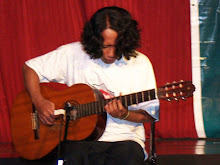.jpg)
Peace maybe just a click away
- Go on the Internet to make friends -- and world peace. That was the message Thursday from a New York conference on the potential power of Internet social networking tools like Facebook to counter terrorism and repressive governments.
"New technology gives the United States and other free nations a significant advantage over terrorists," US Undersecretary of State James Glassman told Web entrepreneurs and human rights activists at New York's Columbia University Law School.
An extraordinary example of e-power was the success on February 5 this year of a grassroots march organized on the Internet against Colombia's FARC leftist guerrillas.
Oscar Morales, founder of "One Million Voices Against the FARC," described how his rallying call to 100 Facebook friends multiplied to 1,500 in less than a day.
"The next day there were 4,000, then 8,000. In just one week it grew to the amazing number of 100,000."
Within a month the anti-FARC movement was able to field two million demonstrators around the globe, including 1.5 million in the Colombian capital Bogota.
Supporters believe Internet-based communities are exactly what violent underground groups and repressive regimes fear.
"The Internet world of the extremists is one of direction -- 'think this, do that,'" Glassman said. "Extremists can't adapt to the social networking because it shakes their rigid ideologies."
Even countries with heavy censorship can't resist, Facebook co-founder Dustin Moskovitz said.
"China pours billions of dollars into the firewall only to have its citizens develop new ways to circumvent it," Moskovitz said. "Control of these mediums is, in the long run, not a battle they can win."
Still, for all the talk, it appeared clear that worldwide justice is a little more than just a click away.
An Egyptian journalist, who asked not to be identified because he fears for his safety, told the conference that Facebook had been crucial in the organization of rare protests in April.
"It allowed us to have a platform to convene, because we are not allowed to meet otherwise," he said.
Yet ironically, while a piece of US high-tech innovation helped protestors, US foreign policy was propping up the country's dictatorship, the Egyptian journalist said.
"The reason that we are under such repression, unfortunately -- and I have to be frank -- is that the Egyptian regime receives support from the West and, particularly, the United States," he said.
"What we want is that the American administration, that talks all the time about democracy and human rights, finally does what it says."
Glassman did not address this, conceding only that Washington had "complex" relations with countries that "can be categorized as oppressive."
However, he did promise a new awareness about how the United States is perceived around the world, with less "preaching at people and telling them what to believe."
"It's taken a while to get to this place," he said, adding that Barack Obama's incoming administration will likely be "very open to these ideas." (AFP via MSN/ Reuters File Photo via Yahoo)




No comments:
Post a Comment